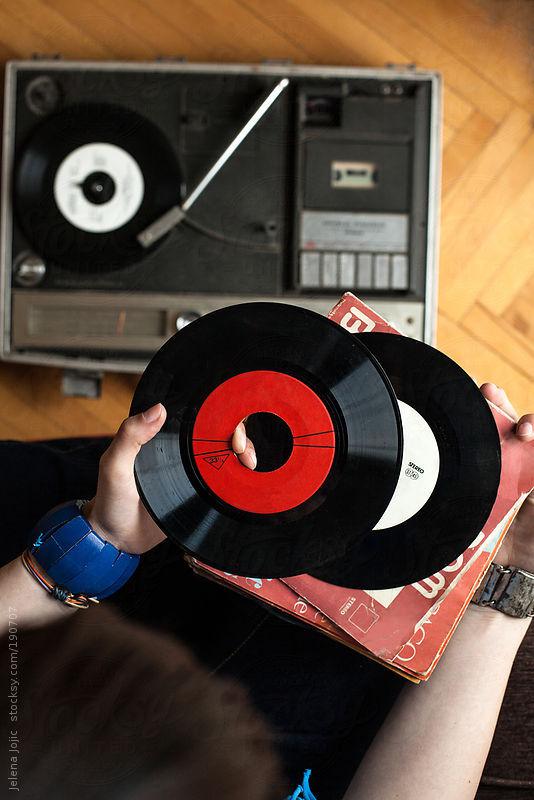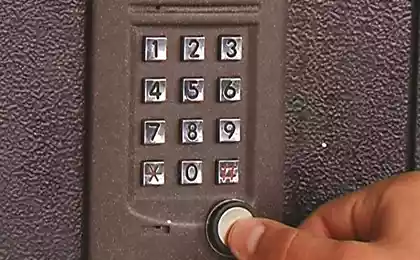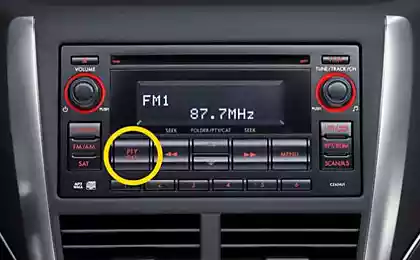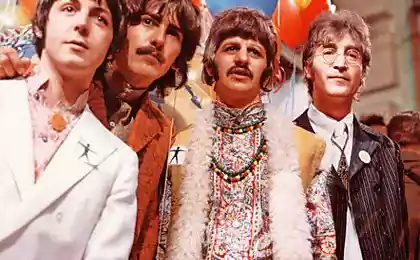1070
The Skip. As the button "Skip track" influenced patterns of music consumption
Welcome Habrazhiteli.
Try to remember how many times you press the Skip today?
Button Skip track is practically everywhere where we get the audio content. It is so common that we can easily learn it even in complex shapes. Skip become commonplace for the modern consumer culture music. But how deeply rooted it? Let's try to look.
In this research article, you'll learn about the behavior of people when it comes to skip music. Find out how often people miss the music, does the demographic data on the habits of the people in the passage of music, which artists and genres more or less likely to induce to click Skip, and much more.
Research conducted Development Manager Echonest , his team about ten years engaged in the analysis of music by an impressive number of parameters. Now Echonest i> is the new division of Spotify i>.

In those days, when I reached maturity musically - we have listened to the plate - to listen to music was something different compared to what exists today. For example, if you do not like to play music, you had to get up from a chair, walk up to the player, gently lift the tone arm and move the needle to the next track. We had to make the effort to rid yourself of listening to three minutes of bad music. Only the most horrible songs worth of all these gestures for switching.
Today, with our trendy iPhones and subscription services on the cloud music rewind did not come back to the liking or boring track there is no difficulty. Just click on the button, and you listen to each song. Now Button Skip - an integral part of the whole process of listening pleasure. Do not like the song? Miss her. Never heard the song? Miss her. Only recently listened to this song? Miss her. Skipping even plays a role in how we pay for music. Most online music services to get the full freedom and the right to skip any song - you need to have Premium Subscriber, otherwise you will be limited to about 5-6 passes per hour.
I was wondering how people use the button Skip, so I spent a lot of time poring over the statistics of how applicable Skip. For this study, I plunged into Spotify, where the guys have built an amazing infrastructure for vast amounts of information with which to easily get an idea of billions of music tracks. I've studied billions playlists million unique listeners from around the world.
What is Skip? For this study, I defined a pass as any student of switching songs before it ended. This can be either directly by pressing "Skip", or the intention to find another song, or pressing a particular song in the playlist until the previous is still playing. Whatever was the reason, if a person does not doslushivaet song to the end, I call it Skip.
How often do people miss? H4> The first and fundamental question to be answered: how often people click the button "Skip"? What is the role omissions in our listening to music, given how easy it is now to waste? Answer: huge role! B>
Skipped over Probability First 5 seconds 24.14% The first 10 seconds 28.97% The first 30 seconds 35.05% before the end of the song 48.60% The following chart shows the average for the SCIP for millions of listeners and billions of plays. The diagram shows a sharp decrease in the number of students at the beginning of the track, when the majority of them decide whether to rewind the song. Then there is a slow but steady decline in the number of listeners, until we reach the end of the song, which is about 50% of the audience.
The following chart shows the average for the SCIP for the first 60 seconds of the composition. Here it is seen that the majority passes occurs during the first 20 seconds, after which the level falls, but does not disappear before the end.
More, we can calculate the overall level of skips for one listener. That is, the average number of passes a listener for one hour.
The average listener / skips per hour - 14.65
The average listener skipat once in four minutes. It's really a lot.
Who always rewinds the song? Is it true that different listeners rewind music differently? Let's see.
gender h4> skip level listeners male - 44, 74%
Based on the platform h4> skip level for your computer - 40, 1%
On the basis of age h4>
When people rewind the most? H4> The following chart shows the features of skipping songs for one day. To create this chart, I studied the behavior in the music of the British (who very conveniently located in the same time zone) for several weeks.
The scheme permits per day h4>
I love a lot skipat. If the music is good - I'm willing to pay for a subscription; The essence of the restrictions I understand, but I'm not ready to pay for it; I believe such restrictions slippery slope; I hate to any restrictions of this kind, if I see - close the site and will not be back; I rarely switch tracks, if the music is good. I all the same to these restrictions; Other. Tell us in the comments. Only registered users can vote in polls. Sign , please. 769 people have voted. Excused 153 people.
Source: habrahabr.ru/post/235467/
Try to remember how many times you press the Skip today?
Button Skip track is practically everywhere where we get the audio content. It is so common that we can easily learn it even in complex shapes. Skip become commonplace for the modern consumer culture music. But how deeply rooted it? Let's try to look.
In this research article, you'll learn about the behavior of people when it comes to skip music. Find out how often people miss the music, does the demographic data on the habits of the people in the passage of music, which artists and genres more or less likely to induce to click Skip, and much more.
Research conducted Development Manager Echonest , his team about ten years engaged in the analysis of music by an impressive number of parameters. Now Echonest i> is the new division of Spotify i>.

In those days, when I reached maturity musically - we have listened to the plate - to listen to music was something different compared to what exists today. For example, if you do not like to play music, you had to get up from a chair, walk up to the player, gently lift the tone arm and move the needle to the next track. We had to make the effort to rid yourself of listening to three minutes of bad music. Only the most horrible songs worth of all these gestures for switching.
Today, with our trendy iPhones and subscription services on the cloud music rewind did not come back to the liking or boring track there is no difficulty. Just click on the button, and you listen to each song. Now Button Skip - an integral part of the whole process of listening pleasure. Do not like the song? Miss her. Never heard the song? Miss her. Only recently listened to this song? Miss her. Skipping even plays a role in how we pay for music. Most online music services to get the full freedom and the right to skip any song - you need to have Premium Subscriber, otherwise you will be limited to about 5-6 passes per hour.
I was wondering how people use the button Skip, so I spent a lot of time poring over the statistics of how applicable Skip. For this study, I plunged into Spotify, where the guys have built an amazing infrastructure for vast amounts of information with which to easily get an idea of billions of music tracks. I've studied billions playlists million unique listeners from around the world.
What is Skip? For this study, I defined a pass as any student of switching songs before it ended. This can be either directly by pressing "Skip", or the intention to find another song, or pressing a particular song in the playlist until the previous is still playing. Whatever was the reason, if a person does not doslushivaet song to the end, I call it Skip.
How often do people miss? H4> The first and fundamental question to be answered: how often people click the button "Skip"? What is the role omissions in our listening to music, given how easy it is now to waste? Answer: huge role! B>
Here are some numbers. First, let's look at how the song is often overlooked during the first five seconds of playback. I call it skips. The probability that the song will be scrolled within the first five seconds, reaches a staggering 24, 14% 35, 05% 48, 6% 50/50
Skipped over Probability First 5 seconds 24.14% The first 10 seconds 28.97% The first 30 seconds 35.05% before the end of the song 48.60% The following chart shows the average for the SCIP for millions of listeners and billions of plays. The diagram shows a sharp decrease in the number of students at the beginning of the track, when the majority of them decide whether to rewind the song. Then there is a slow but steady decline in the number of listeners, until we reach the end of the song, which is about 50% of the audience. The following chart shows the average for the SCIP for the first 60 seconds of the composition. Here it is seen that the majority passes occurs during the first 20 seconds, after which the level falls, but does not disappear before the end.
More, we can calculate the overall level of skips for one listener. That is, the average number of passes a listener for one hour.
The average listener / skips per hour - 14.65
The average listener skipat once in four minutes. It's really a lot.
Who always rewinds the song? Is it true that different listeners rewind music differently? Let's see.
gender h4> skip level listeners male - 44, 74%
Skip level female students - 45, 23%
Apparently from the floor almost nothing depends.
Based on the platform h4> skip level for your computer - 40, 1%
Level passes on mobile phone - 51, 1%
When we are at the computer, we tend to listen to music for longer and less rewind, but on a mobile device, we are more involved in the process of interaction with our music.
On the basis of age h4>
This chart shows the relative level skips the index age of the listener. It shows that young listeners skipat most - more than 50%. With age, the level decreases, reaching its lowest point at about 35%. Interestingly, the level of passes again begins to rise in people who are 40 or far exceeded only 50. I have a couple of ideas as to why this may occur. The first theory is related to how much free time a person has. Teens rewind anymore as they have more options for editing your music stream while the thirties, with their families and endless work, can not devote so much time music players. The second theory, proposed by the analyst Spotify - Chris Tynan, explains the fact that children use their parents' accounts.
When people rewind the most? H4> The following chart shows the features of skipping songs for one day. To create this chart, I studied the behavior in the music of the British (who very conveniently located in the same time zone) for several weeks.
Chart reports that minimal level skips when people are less likely to pay attention to the music, that is, during sleep or work. Index reaches a peak in the morning, when people start to the day and ready to work, and at the end of the day, when they return home or socialize with friends. The diagram shows that people pay special attention to careful monitoring of his musical entourage.
In the following diagram, level skips intertwined with the average value by the number of plays. Interestingly, the differences of the number of skips does not affect the way when listening to music the most. Number of plays remained stable and even grows towards the end of the day. While the number of skips constantly changing.
The scheme permits per day h4>
This chart shows the average level of skips per day. Again demonstrating that it is higher at the weekend, when people have free time to follow the music and rewind tracks unusable.
Conclusion
Button badge really changed the way we listen to music. It plays an important role in this interaction with its musical environment. When we strongly involved in the music we make more passes, but only when the music serves as a backdrop, for example, when we work or relax, we rewind much rarer. When we have more free time, such as in his youth, or at the weekend, or when we get home from work - we miss more tracks. Because it is the time we pay more attention to the music. Personally, I was very surprised how often we tend skipat. On average, we skip every other song you hear.
Dropouts become an integral part of how we consume music. It is not surprising that the "unlimited skips" became one chip, which causes people to subscribe to a premium account. This may also be the reason why people are switching from one service to another, when the first does not provide the possibility of unlimited skips even on the Premium subscription.
Experiment from contributor translation
The Spring Camp Yandex Tolstoy we launched music service personal selection of music. With this knowledge we have learned to constantly carry out experiments. With skips including. We measure all the actions of our listeners, and we managed to understand the difference between the patterns of listening during the first and subsequent sessions. New users will almost always differ in their behavior from users who have returned for a new portion of the music. More precisely: the first day exploring the service the user wants to make sure that the music chosen is relevant. For this, many, many people skipat. Up to 95% of the tracks in the first session of the people listen to less than 5 seconds. Members looking covers, trying to understand on what relations these tracks appear in the playlist and make a decision, they need the service or not. Usually it skips 20-60. If the mechanism of selection of relevant works, the people come back. In this case 28% on the second day, and 9% at 30 days. Summary: in all sessions after the first people skipat much rarer.
Our most popular case - quiet music (great for work), and those who miss the first day of the tracks, for the most part, changes the approach to listening in the next few days. Many simply include music and switch tab. Then listen to music in the background, and therefore much less skipat. This fully confirms the conclusions of Paul that while working people tend to "disconnect" from the music, it is perceived smooth background, if chosen correctly. On comparison with the huskies skips you can learn more on our blog.
When we limited the number of skips on the first day, we saw a huge dump after notifying users that skips ran out and you have to pay. Moreover, the return of the users also noticeably rolled down.
Conclusion
You can not restrict people want to check the value of the service. Especially - you can not ask for money at this stage. As a result, we have removed the restriction, as people lose the desire to use the service, which they did not have time to understand. Conversion to pay grown within the error. Fold increase or decrease the conversion was not.
Now we are thinking to conduct the same experiment with the restriction on the skip, but in the third or fifth session, that is, when the listener is already figured out why he is our service. Taking this opportunity, I would like to ask you how you feel about this kind of mechanic?
Suppose you have already seen that the service plays a very relevant for you music and decided to go back, but suddenly you are asked to pay a subscription after the 10th hour of the skip. How do you feel will concern? Skip, skip or not. That's what a poll
I love a lot skipat. If the music is good - I'm willing to pay for a subscription; The essence of the restrictions I understand, but I'm not ready to pay for it; I believe such restrictions slippery slope; I hate to any restrictions of this kind, if I see - close the site and will not be back; I rarely switch tracks, if the music is good. I all the same to these restrictions; Other. Tell us in the comments. Only registered users can vote in polls. Sign , please. 769 people have voted. Excused 153 people. Source: habrahabr.ru/post/235467/
Another "smart" socket with his hands. Part 1
At the University of Tokyo have developed a fast runner bipedal robot with new balancing system























